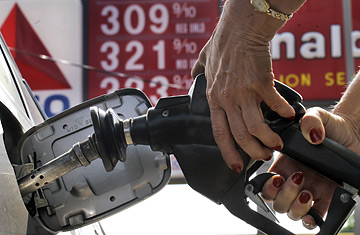
I've noticed that airline ticketing agents have an interesting language when it comes to describing how full a flight is. From my too-frequent air travels, I've learned that being "full" is not absolute. The scale of fullness includes: a somewhat full flight, a full flight and a very full flight. Or, in my very unfortunate case Friday evening of Memorial Day weekend, surrounded by families, extra luggage, strollers, in the middle of travel mayhem — the extremely full flight.
As I contorted myself into a position that allowed me to open my laptop to do some work on the plane, I wondered that with all of the latest economic indicators being so negative, why are so many families flying, presumably embarking on their summer vacations? In light of skyrocketing gas prices, falling home prices and the looming sub-prime lending collapse, are U.S. consumers still confident in our economy?
The latest economic news hasn't been encouraging. Gas prices reached an all-time high earlier this month. For the first time since 1991, quarterly home prices declined, according to the S&P/Case Shiller U.S. Home Price Index. And yet analysts were surprised by the unexpected rise in consumer confidence in the economy, reported this week in the Conference Board's Consumer Confidence Index (CCI).
Confidence indices like the CCI and the Michigan Consumer Sentiment Index rely on consumer surveys, telephone or mail-based, to give the marketplace an indication of what consumers think of current and future economic conditions. This presents several problems: who answers or fills out these surveys, are they truly representative of the U.S. population (how many of you reading this column have participated in a consumer confidence survey, for instance?), and do consumers really reveal their true sentiments?
Perhaps Internet actions speak louder than survey answers. Take the cost of gasoline. Despite gasoline prices reaching an all-time high this month, searches for "gas prices" during September 2005, when gas prices breached the $3/gallon mark, were six times greater than last week when the average gallon of regular gas hit $3.21. But to get at the question of what consumers think about gas prices and how they view the effect on the economy, you have to dig a little deeper. For example, how do soaring pump prices affect our vacation plans? Visits to U.S. travel sites are down only 2% when compared to the same time last year; visits to airline sites are down only 3% compared to last year at this time, explaining my "extremely full flight." Consumers' short-term economic outlook might be reflected in overall vacation plans. Examining the most common search phrases containing "vacation" indicate no pull-back in the scope of our getaway plans; the most popular vacation phrase: "Hawaii Vacation."
The housing market is a different story. The ratio of searches for "homes for sale" compared to "homes for rent" have reached their lowest point over the last two years in April and May 2007, hovering around 1.5 sale queries for every rent query, which indicates that potential home buyers are becoming more tentative. Maybe the best test of how U.S. consumers feel about the economy is to get in their minds regarding costly projects like building or remodeling a house. In the Internet age, if you're thinking of taking on a large-scale building project, you would likely visit home plan websites and building construction firms online. Visits to those sites are down 48% compared to the same time in 2006.
Struggling for some personal space in my middle seat and sulking about the upgrade to business class that never materialized, I began to think that we've taken certain economic pains, such as gasoline prices, in stride, while longer-term ones, like the housing market, have us deeply concerned. I have another theory, also related to flying: the health of the airline industry is directly reflected by the quality and quantity of food available in flight. On that basis things are bad, really bad, but they have been for as long as I can remember. Until we're all served decent meals on flights, I won't have much confidence in travel, or in the economy.
Bill Tancer is general manager of global research at Hitwise.
